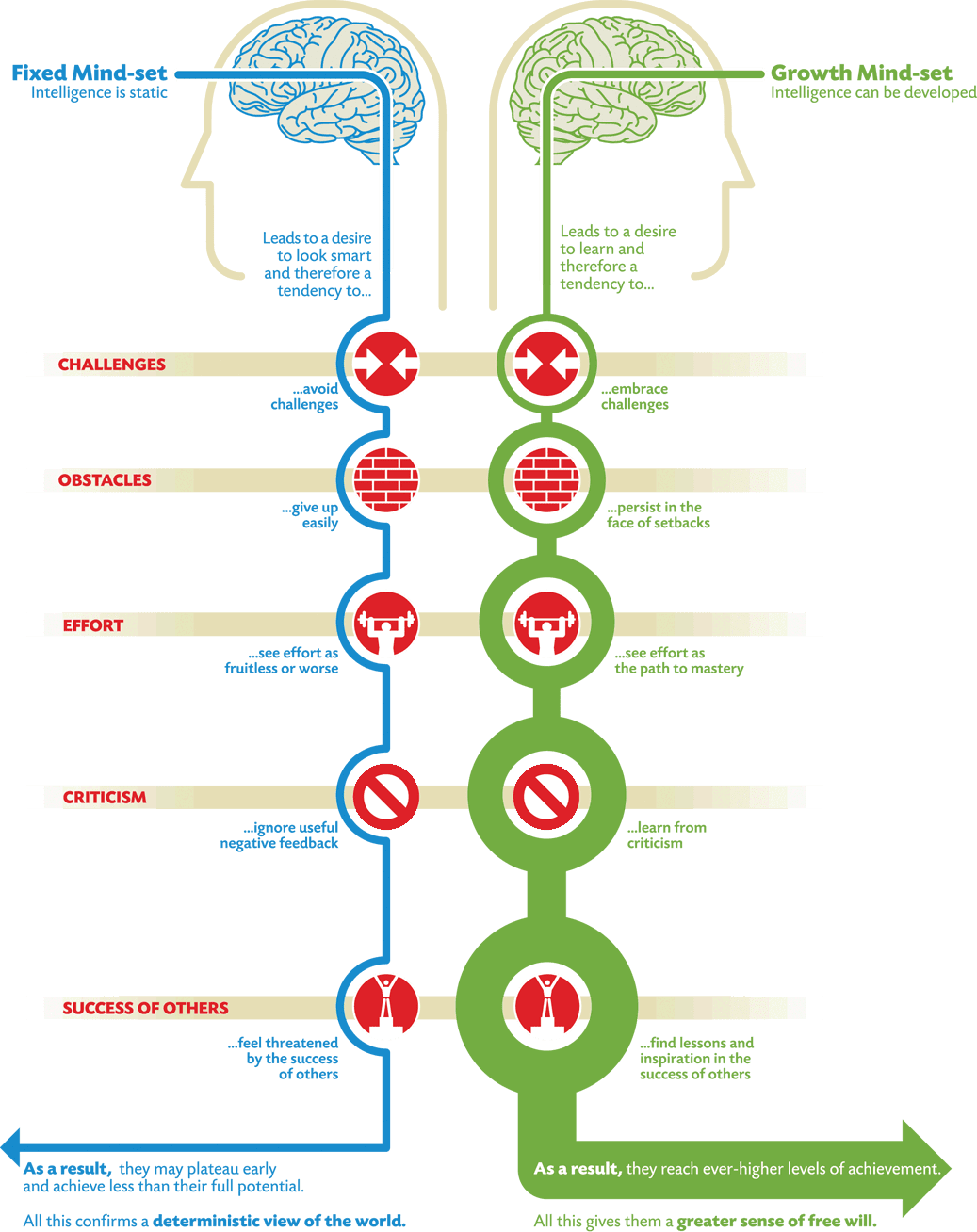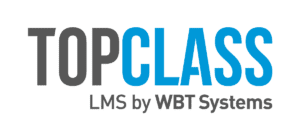Here’s a statement to consider: “You can learn new things, but you can’t really change how intelligent you are.” Would you say you mostly agree or disagree? And how about this statement: “No matter what kind of person you are, you can always change substantially.” Do you mostly agree or mostly disagree?
According to Dr. Carol Dweck, author of Mindset: The New Psychology of Success, your answers to questions like these can reveal a lot about you when it comes to learning—specifically, whether you possess a fixed or growth mindset. And because mindset impacts multiple levels of what we do as learning businesses, it’s an important concept to be aware of and understand.
In this episode of the Leading Learning podcast, Celisa and Jeff discuss the idea of mindset including Dweck’s research on the topic, how it affects us personally and the impact it has on learners and learning businesses.
To tune in, just click below. To make sure you catch all of the future episodes, be sure to subscribe by RSS or on iTunes. And, if you like the podcast, be sure to give it a tweet!
Listen to the Show
Read the Show Notes
[00:18] – A preview of what will be covered in this episode where Celisa and Jeff discuss the idea of mindset from Dr. Carol Dweck’s book, Mindset: The New Psychology of Success.
What Is Mindset?
[01:27] – Dweck’s research and work have become well known in the dozen years since Mindset came out, so many listeners are probably familiar with the term mindset. And even if it happens to be a new term, it’s pretty self-explanatory. Mindset is the frame of mind, the perspective you bring to anything you do or experience in life, whether on the job, at home, professionally, socially, intellectually. And Dweck says there are two mindsets: the fixed mindset and the growth mindset. If you have a fixed mindset, you believe “your qualities are carved in stone.”
A growth mindset, on the other hand, is founded on the “belief that your basic qualities are things you can cultivate through your efforts.” In other words, the growth mindset believes intelligence can be developed, and the fixed mindset believes intelligence is static. To see how those mindsets play out, Dweck uses statements as a way for individuals to self-assess their mindset. The statement “You can learn new things, but you can’t really change how intelligent you are.” conforms to a fixed mindset. And the statement, “No matter what kind of person you are, you can always change substantially”, reflects a growth mindset.

How Does Mindset Relate to Learning?
[03:25] – The growth mindset ties directly to learning. As Dweck writes, “…the belief that cherished qualities can be developed creates a passion for learning.” (p. 7). That is, if you believe you can change and always change substantially, and that your own efforts make that change possible, you’re going to embrace the potential of learning. So, it seems that those of us who work in learning businesses should, by default, embrace the growth mindset. And yet that doesn’t always happen. It’s important to recognize that we bring different mindsets to different circumstances. Something Jeff wrote about in 10 Ways to Be a Better Learner – and that he continually sees in himself and in others – is that we may have a growth mindset in many areas of our lives, and yet be stymied by a fixed mindset in others.
Dweck makes the point that as individuals we’re usually not entirely of the fixed mindset or entirely of the growth mindset. So I might have a growth mindset about my ability in a sport—I can practice tennis and get better. But I might have a fixed mindset about my ability with music—there’s no way I can learn to play the violin at this point in my life. One key to becoming a better learner is to ferret out these fixed-mindset areas, and, where appropriate, replace them with a growth mindset. It is common for both learning business professionals and learning businesses to feel for example, that they have a growth mindset as relates to creating effective education, but then they feel they have no abilities—or capacity for growth—when it comes to marketing.
Also, in a variation of this mixed-mindsets way of being is that we may have a fixed mindset about our own ability in some area, but have a growth mindset for others—I might think it’s too late for me to take up banjo, but my kids can learn any musical instrument they want if they just put in the time and effort. Those of us working in learning businesses may judge our own abilities differently than those of the learners and customers they serve. We might embrace the almost limitless possibilities of learning (the growth mindset), for example, but then think our learners will never get it. Or maybe it’s vice-versa—they can do anything if they’ll just engage with the learning experiences you create, but you think it’s impossible to ramp up your learning business in new areas.
So keep in mind, mindset applies (a) to ourselves, (b) to the learners we serve, and (c) to our learning businesses. And we want to talk about each of those groups, a, b, and c, so our next three questions will do that.
Sponsor: WBT Systems
[06:56] – Having a grateful mindset, we want to be sure to thank our sponsor for this quarter.
WBT Systems develops the industry-leading TopClass LMS, which delivers transformative professional development experiences for education and certification programs. With a single point of support from in-house integration experts, TopClass LMS easily integrates with a wide variety of systems to provide efficient administration and a unified learning experience. WBT supports organizations in using learning technology to help drive growth in membership, increase revenues, and enhance the learning experience. WBT believes in truly understanding your challenges and partnering with you to ensure the success of your education programs.
How Does Mindset Impact Us Personally?
[07:57] – We’ve begun to address this some already—mindset has huge ramifications because it’s the backdrop for everything you do. How you engage with others, how you learn, what you choose to learn. But it’s worth adding that the growth mindset gives you a kind of perseverance. Dweck writes, “The passion for stretching yourself and sticking to it, even (or especially) when it’s not going well, is the hallmark of the growth mindset.” (p.7) Which means the two mindsets see challenge, risk, and effort very differently. The growth mindset embraces challenge and effort and sees failure as an opportunity to learn and improve.
On the other hand, the fixed mindset sees challenge and effort as dangerous—if intelligence social skills or whatever ability is fixed, then working hard for something is a sign of inferiority—the logic of the fixed mindset being if you’re good at it, it should come naturally, effortlessly, immediately.
The fixed mindset sees failure as forever—if you have a fixed mindset and you fail at something, then you’re bad at that thing. Versus a more generous growth mindset view: you did that thing badly that one time. And this view of setbacks is so important because we know challenge and effort are important aspects of learning—think of effortful retrieval, for example, which makes us think of the book, Make It Stick: The Science of Successful Learning. The authors of that book mention Dweck more than once – in fact, dozens of times – because they recognize how important mindset is to successful learning. See our interview with Make It Stick co-author, Peter C. Brown.
How Does Mindset Impact the Learners We Serve?
[10:20] – First and foremost, mindset impacts the learners we serve in the same way that it impacts us—mindset determines the attitude that learners bring to a learning experience, and the learners’ mindset plays a huge part in how effective any learning experience can be. And the mindset won’t be even across groups of learner we serve—some learners will come with a growth mindset, others with a fixed. This adds a dimension to the “prior knowledge” issue that Malcolm Knowles pointed out. Not only do learners come to our offerings with different levels of expertise and experience in the subject matter – different prior knowledge – but they also bring different mindsets. Which makes teaching extra tricky, but the good news is that people can be put into a growth mindset. And doing that—putting your learners in the growth mindset—strikes us as a potentially powerful tool for learning businesses.
So how do we put learners in a growth mindset? Here are some ideas.
One is simply to tell learners that whatever they’re about to study can be learned, and the learning experience you’re offering will give them the chance to learn it.
A related approach is giving learners an article. Dweck ran tests where she gave learners a scientific article that described people who did not have natural ability, but who developed exceptional skills. That was enough to put her research subjects into a growth mindset at least for a time.
We can also put learners in the growth mindset through the messages we send. When setting rules and norms for instructor-led or facilitated experiences, the instructor or facilitator can stress that effort and contribution are valued above being right or doing something quickly. And this kind of upfront work is something we discussed in our interview with Robert Cialdini in terms of pre-suasion in the learning context. Just putting a question such as, “Do you consider yourself a committed lifelong learner?” on a slide before the start of a conference session can pre-suade those in the room to think of themselves as lifelong learners. You could further refine what the slide says to put those in the room in growth mindset but putting something like, “Do you believe, no matter what kind of person you are, that you can always change substantially?”
[14:23] – And then of course you need to make sure that what you do after that priming and pre-suasion remains focused on the growth mindset. So, feedback should stress and praise the learners’ effort and process vs. judging learners’ talent or intelligence. And note all of these approaches can apply to asynchronous online courses too—you don’t have to have a human facilitator. It can just as easily be a matter of the text and audio in an e-learning course.
And, a word of caution. Just as we can put people in a growth mindset, we can also put them in a fixed mindset, so we have to be careful. We need to make sure those designing and delivering learning experiences know about the mindsets and understand what triggers them. For example, they need to know that labels can trigger the fixed mindset. Even positive labels can do this—calling someone smart equates that person with their achievement or performance. To prompt a growth mindset, you want to praise effort or way of thinking—saying, “That was a smart way to think about that problem” is different than saying, “You’re smart.”
And sometimes labels that seem innocuous, Dweck notes, can have a negative effect as well. She cites research that shows even checking a box to indicate your race or sex can trigger the stereotype in your mind and lower your test score (p. 75). So it’s important to think about the potential impact on learners whenever you’re asking them to identify or label themselves. This can also feed into bias, a concept we discussed in episode 140, Getting Conscious About Bias with Howard Ross and Shilpa Alimchandani.
Sponsor: Community Brands
[17:59] – Before moving on we want to thank our sponsor for this quarter.
Community Brands provides a suite of cloud-based software for organizations to engage and grow relationships with the individuals they serve, including association management software, learning management software, job board software, and event management software. Community Brands’ award-winning Crowd Wisdom learning platform is among the world’s best LMSes for corporate extended enterprise and is a leading LMS for association-driven professional education programs. Award-winning Freestone, Community Brands’ live event learning platform, is a leading platform for live learning event capture, Webinars, Webcasts, and on-demand streaming.
How Does Mindset Impact Our Learning Businesses?
[18:51] – Mindset determines how we perceive the capacity of our learning business and how we cultivate that capacity as leaders (because as leaders we have the ability to influence the mindset of those who follow us). And note capacity – and leadership – are both domains in our Learning Business Maturity Model™. Dweck, in fact, dedicates a chapter to “Business: Mindset and Leadership,” and, no big surprise, she finds that good leaders have a growth mindset. Fixed mindset, on the other hand, tends to be toxic—think big-ego CEOs.
Another danger of a fixed-mindset organization is that it tends to encourage groupthink. Which then, of course, deprives the organization of the diversity of opinions and views that often yields insight into the market. So you can self-assess at the organizational level and ask questions to get a feeling for the overall mindset there. For example, “How do you act towards others in your workplace? Do you believe that they can change? How do others act towards you? Do they believe that you can change?”
What Take-Aways Do We Want to Emphasize?
[21:58] – We’ll emphasize that growth mindset doesn’t equal learning. Nor does a fixed mindset mean no learning. But the growth mindset increases the odds that learning will happen and increases the odds of that learning sticking. We also want to emphasize that mindset impacts multiple levels of what we do as learning businesses, that embracing a growth mindset is good for our learners, for our learning businesses, and for us, especially in our work as leaders of learning.
[23:05] – Wrap-Up
If you are getting value from the Leading Learning podcast, be sure to subscribe by RSS or on iTunes as it helps us get some data on the impact of what we’re doing.
We’d also appreciate if you give us a rating on Apple Podcasts (formerly known as iTunes) by going to https://www.leadinglearning.com/itunes. We personally appreciate your rating and review, but more importantly reviews and ratings play an important role in helping the podcast show up when people search for content on learning and leading.
And we would be grateful if you check out our sponsors for this quarter. Find out more about Community Brands and WBT Systems.
Finally, consider telling others about the podcast. You can send a tweet by going to leadinglearning.com/share. You can also Like us on Facebook at facebook.com/leadinglifelonglearning and share us with others there. However you do it, please do help to share the good word about the podcast.
[25:07] – Sign off
See Also:




 Are your offerings an expense or an investment?
Are your offerings an expense or an investment?
Leave a Reply